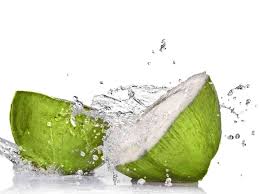Cracked lips
Healing foods: The most common nutritional deficiencies causing cracked lips are vitamin C, riboflavin [vitamin B2] or iron. To ensure you’re getting enough vitamin C, try citrus fruits, broccoli, potatoes and strawberries; the best sources of riboflavin include dairy, mushrooms and almonds; and meat and brown rice will give your iron stores a natural boost.
Another problem is that you’re not absorbing nutrients well enough. If you’re drinking plenty of water and it’s not improving, it's recommend a blood test or a dietary assessment.
Lifestyle tips: Coconut oil is a good DIY lip balm. Also advises sipping water regularly, and taking a break from exposure to heating or air conditioning.
Eczema
Eczema is a recurring red, bumpy and
itchy inflammatory skin condition. Eczema has been linked to consumption of dairy and wheat products, seafood,
eggs, nuts, citrus fruits, chemical food additives, preservatives, colouring and
alcohol.

Healing foods: Probiotics – in either yoghurt or supplements – can help. These increase the good bacteria and ease digestion.
Giving your diet a boost with anti-inflammatory foods such as flaxseed oil and vegetables that are rich in vitamins A and C (such as broccoli, tomatoes, carrots and watercress) will help calm and nourish the inflamed skin.
Lifestyle tips: Tobacco smoke, hot and humid or cold and dry weather, air conditioning or overheating, dust mites, grass and plants, harsh fabrics and chemicals (soaps, shampoos and washing powders). Try to choose natural when possible and moisturise your skin to protect it from the elements.
Healing foods: Probiotics – in either yoghurt or supplements – can help. These increase the good bacteria and ease digestion.
Giving your diet a boost with anti-inflammatory foods such as flaxseed oil and vegetables that are rich in vitamins A and C (such as broccoli, tomatoes, carrots and watercress) will help calm and nourish the inflamed skin.
Lifestyle tips: Tobacco smoke, hot and humid or cold and dry weather, air conditioning or overheating, dust mites, grass and plants, harsh fabrics and chemicals (soaps, shampoos and washing powders). Try to choose natural when possible and moisturise your skin to protect it from the elements.
Flatulence
It’s completely normal to pass wind between 10 and 20 times a day but any
more could indicate a digestive disorder. Flatulence is one of the top reasons
people see a dietitian.
 Certain foods can lead to excess or smelly wind as they cause a build up of
gas in the intestines. These include chilli, spices, beans, garlic, onion,
cauliflower, broccoli, brussels sprouts and cabbage.
Certain foods can lead to excess or smelly wind as they cause a build up of
gas in the intestines. These include chilli, spices, beans, garlic, onion,
cauliflower, broccoli, brussels sprouts and cabbage.
Healing foods: As well as cutting back on these foods, taking a probiotic to correct microflora in the gut. Or try some cultured foods such as kefir yoghurt or cultured/lacto-fermented sauerkraut.
Lifestyle tips: Chew food until it’s liquid and drink plenty of water. Eat slowly, avoid carbonated drinks and use straws so you’re not gulping air. Mostly it’s nothing to worry about. But if it accompanies diarrhoea or constipation, see your GP.

Healing foods: As well as cutting back on these foods, taking a probiotic to correct microflora in the gut. Or try some cultured foods such as kefir yoghurt or cultured/lacto-fermented sauerkraut.
Lifestyle tips: Chew food until it’s liquid and drink plenty of water. Eat slowly, avoid carbonated drinks and use straws so you’re not gulping air. Mostly it’s nothing to worry about. But if it accompanies diarrhoea or constipation, see your GP.
Hair loss
Most people lose about 50-100 hairs a day. If you’re losing more, your diet
could be to blame.
Healing foods: Hair loss in some people following dramatic weight loss, as there’s often a deficiency in protein, iron or zinc. These nutrients are found in red meat, chicken and fish. Pregnancy and childbirth are other times when a drop in iron levels, and accompanying hair loss.
Lifestyle tips: Stress is key in some types of hair loss. Find a way to relax and get stress under control, while boosting your diet.
Healing foods: Hair loss in some people following dramatic weight loss, as there’s often a deficiency in protein, iron or zinc. These nutrients are found in red meat, chicken and fish. Pregnancy and childbirth are other times when a drop in iron levels, and accompanying hair loss.
Lifestyle tips: Stress is key in some types of hair loss. Find a way to relax and get stress under control, while boosting your diet.
Leg cramps
You don’t need to put up with painful muscle contractions at night or after
exercise – a few simple tips can ease the pain.
 Healing foods: The biggest cause of cramps is fluid
deficiency. Potassium can help ease muscle cramps, and coconut water contains five times more potassium than some sports
drinks. Have sugar-free coconut water varieties or sip from a young coconut.
Healing foods: The biggest cause of cramps is fluid
deficiency. Potassium can help ease muscle cramps, and coconut water contains five times more potassium than some sports
drinks. Have sugar-free coconut water varieties or sip from a young coconut.
Lifestyle tips: Leg cramps can also be brought on by poor circulation. Dry-brush daily before you shower to enhance circulation, and drink warming gingerroot teas. (You can make your own with fresh ginger and honey). And remember to stretch before and after a workout.
Lifestyle tips: Leg cramps can also be brought on by poor circulation. Dry-brush daily before you shower to enhance circulation, and drink warming gingerroot teas. (You can make your own with fresh ginger and honey). And remember to stretch before and after a workout.
No comments:
Post a Comment